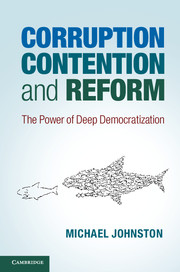Book contents
- Frontmatter
- Dedication
- Contents
- List of Figures
- List of Tables
- Preface
- Acknowledgments
- 1 Reform in an imperfect world
- 2 “Deep democratization” and the control of corruption
- 3 First, do no harm – then, build trust: reform in fragile and post-conflict societies
- 4 Official Moguls: power, protection . . . and profits
- 5 Oligarchs and Clans: high stakes and insecurity
- 6 Elite Cartels: hanging on with a little help from my friends
- 7 Influence Market corruption: wealth and power versus justice
- 8 Staying power: building and sustaining citizen engagement
- Appendix Recognizing the syndromes of corruption
- References
- Index
4 - Official Moguls: power, protection . . . and profits
Published online by Cambridge University Press: 05 June 2014
- Frontmatter
- Dedication
- Contents
- List of Figures
- List of Tables
- Preface
- Acknowledgments
- 1 Reform in an imperfect world
- 2 “Deep democratization” and the control of corruption
- 3 First, do no harm – then, build trust: reform in fragile and post-conflict societies
- 4 Official Moguls: power, protection . . . and profits
- 5 Oligarchs and Clans: high stakes and insecurity
- 6 Elite Cartels: hanging on with a little help from my friends
- 7 Influence Market corruption: wealth and power versus justice
- 8 Staying power: building and sustaining citizen engagement
- Appendix Recognizing the syndromes of corruption
- References
- Index
Summary
It is not power that corrupts but fear. Fear of losing power corrupts those who wield it and fear of the scourge of power corrupts those who are subject to it.
– Aung San Suu KyiSidi Bouzid, Tunisia, December 17, 2010
The events that took place in the central Tunisian town of Sidi Bouzid in late 2010 are familiar by now. But they are worth another look, for not only did they mark the beginning of the “Jasmine Revolution” that ousted long-time President Zine El Abidene Ben Ali and trigger the “Arab Spring” uprisings; they also highlight underlying aspects of Official Moguls corruption that may not be fully appreciated. For decades in Tunisia and Egypt – the other case to be considered in this chapter – political power was tightly held at the top, institutions were weak, and both citizens and the economy were exploited by top-level figures, their families, and their favorites.
On that Friday morning 26-year-old Mohammad Bouazizi, a young fruit and vegetable seller and the sole breadwinner for his widowed mother, his uncle, and five siblings, was accosted by market inspectors and a policewoman because his vegetable cart was unlicensed (this account draws upon Abouzeid 2011; De Soto 2011). Such encounters are common, and sometimes they can be settled by paying a small fine. But in this instance, as in many others, the officer apparently was after a larger bribe. She refused Bouazizi’s offer to pay the ten-dinar official fine (between six and seven US dollars, not a trivial sum for a poor vegetable seller) and instead seized some of his produce, as well as his scales – essentially, his sole piece of business capital. Then the policewoman slapped Bouazizi, spat in his face, and insulted his dead father – all in front of spectators. The young man went to local government headquarters; whether he sought to complain, get his scales back, or even to apply for a license mattered little, for no one would see him. A short time later he returned to the government offices; in front of the building he doused himself with paint thinner, which he set alight. Bouazizi was hospitalized, but died on January 4, 2011 – by which time his fellow Tunisians were in open rebellion against the regime. By January 14, Ben Ali had fled.
- Type
- Chapter
- Information
- Corruption, Contention, and ReformThe Power of Deep Democratization, pp. 86 - 118Publisher: Cambridge University PressPrint publication year: 2013



